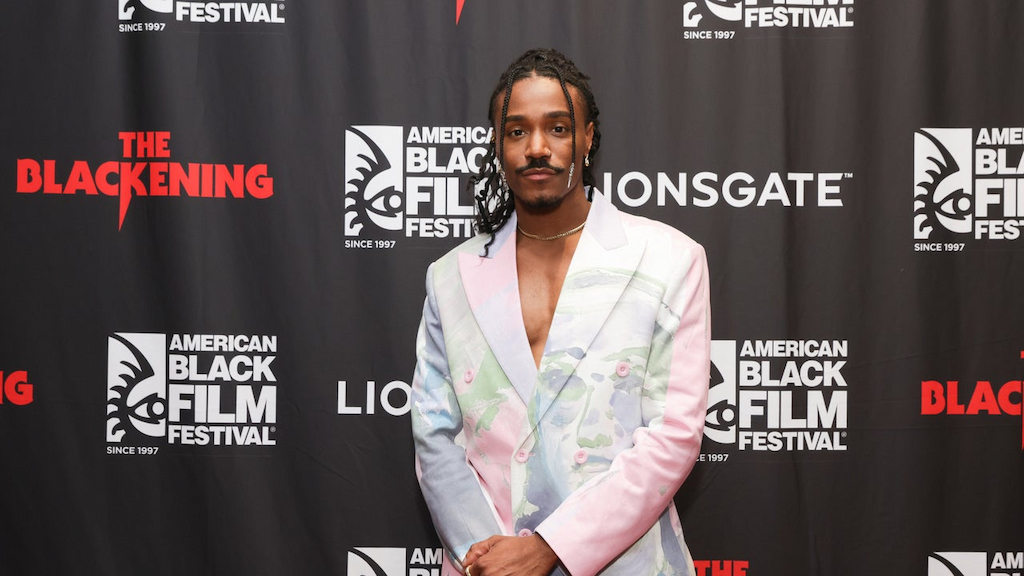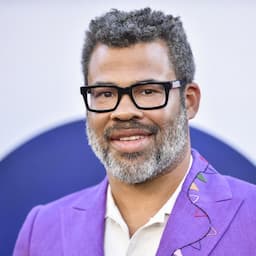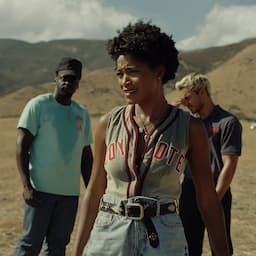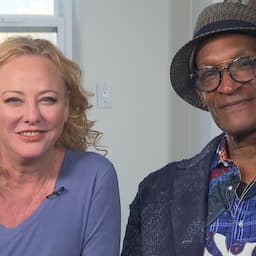Perkins chatted with ET about 'The Blackening' breaking movie tropes, subverting expectations and expanding perceptions of Blackness.
When it comes to classic horror film tropes, the longstanding joke that Black characters are often the first to die in horror films has become less of a gag and more of an expectation. In a similar vein to Jordan Peele's Get Out and Nia DaCosta's Candyman, The Blackening is here to turn those genre tropes on their head.
The horror-comedy follows a group of Black friends who reunite for a Juneteenth weekend getaway only to find themselves trapped in a remote cabin with a twisted killer. Forced to play by his rules, the friends soon realize, "This ain't no motherf**king game."
Tim Story directs with a screenplay and screen story written by Tracy Oliver and Dewayne Perkins, the latter of whom created the original concept as a sketch while performing at an improv theater in Chicago.
"When I initially wrote the sketch, I did not think about what it could be," Perkins, who previously wrote for Brooklyn Nine-Nine, tells ET. "I kind of was just creating it for what it was needed for, and then, as it began to snowball into a much bigger thing, it reinforced in me that making your own stuff can really change your life in ways that you never know."
The sketch went from the Chicago stage to an even bigger stage in D.C., where Comedy Central executives were in the audience. As 3PEAT created a web series of sketches for the network, Perkins pitched "The Blackening," which was the network's first pick. The short quickly went viral.
"When we filmed the sketch for Comedy Central, I thought that was like the win, like, 'Oh, this sketch that was on fun stage is now being filmed and put into the world where a lot more people can see it.' And I thought, 'Wow, this is something,'" Perkins recalls. "And then it went viral, and I said, 'Wow, this is something.' And then Tracy called and said, 'This should be a movie,' and I said, 'Wow, this is even bigger!' For now, to be at this point, I don't have many words cuz I just didn't think that this was possible. Now that it is, I have a new outlook on life."
Oliver is well-known for her work behind the camera; the producer has co-written three other films, including Barbershop: The Next Cut, Girls Trip, and Little, created and wrote the BET television series First Wives Club and wrote the screenplay to the 2019 film adaptation of The Sun Is Also a Star.
Perkins gushes about his experience with Oliver, saying their collaboration continues "a theme" in his career where "Black women have really been essential" to his success.
"[They] see me and recognize my skills, guiding me to new heights," he adds, noting that Amber Ruffian, for whom Perkins works as a staff writer on The Amber Ruffin Show, is another such Black woman.
"So I'm just very, very grateful that Tracy saw the potential in what I did. And then, working with Tim Story, I can honestly say [he is one of my] favorite people I've ever worked with," the comedian continues. "He moves in such a human-first way. He's very kind, he's very considerate, he's very caring, and he really created an environment that allowed the performers and the crew to give their best performances, to give their best work."
In addition to Perkins, said performers include Grace Byers, Jermaine Fowler, Melvin Gregg, X Mayo, Antoinette Robertson, Sinqua Walls, Jay Pharoah and Yvonne Orji.
The Blackening joins the ranks of the ever-growing number of films with a mostly Black cast and production crew -- a factor that Perkins says made the experience a novel and healing one.
"I've had experiences being the only Black person at a job, and just the amount of energy that is explaining your identity, explaining your reasoning behind doing things, and you don't realize until you [reflect] how that drains you," he shares when looking back at his time on The Blackening. "And when you don't have to do that, you're then able to punch up your jokes, to add more. I think it just made the art better to be able to have a commonality, a shared experience with the team that I was working with."
That's an element that Perkins and Oliver added to the film itself, writing a Black film that offers no explanations or interpretations for the way any of the characters move or behave. Whether it's why someone would add too much sugar to their Kool-Aid or why the game of Spades is not a game, there is no teaching moment for the audience when it comes to anything in the film. Everything just is.
"Because the film is so unapologetically Black, there's a lot of jokes, there's a lot of references that we don't explain because we didn't want to. Similar to how Tracy and Tim [and I] know a lot about the [horror] genre and yet, the movies are not made necessarily with us in mind," he notes. "And so, being able to keep that same energy has allowed us to show that Blackness is not niche, it has universality in it as well. And if you don't know [something] then look it up, and that's how you learn and grow as a person. So I think the experience of having an all-Black creative team was very special and really gave an opportunity to create in a way that I have not been able to."
Perkins shares that he believes the line between authentic representation in films and inclusivity that falls flat is the intention to "define Blackness in a definitive way."
"We are not creating the Black film, we're creating a Black film," he emphasizes, adding that the latter means a film that offers a perspective of Blackness but in no way dictates that. "Like, this is what it is. And that is the whole point of the movie is that there is no way to definitively define Blackness. Blackness is attached to you being Black, whatever you do, and all Black people have very different experiences. Even me, being a queer Black man, my experience is not necessarily every other Black person's experience. So I don't feel a need to explain that because how would I?"
Perkins' character, Dewayne, takes much from his actor, and his survival was an important factor in the production's desire to subvert classic horror trope expectations. Instead of "burying their gays," Perkins says he and Oliver wanted to "really force people to examine their own opinion of how [they] perceive people. I really wanted to examine the gay best friend trope."
"As a gay person who is best friends to people, I would see that and be like, this is not a trope. These relationships are actually real, there are stakes to them. And I don't think that they should only be served as a tertiary arc that informs the main character, [they should also be] at the forefront and given as much space so that by the end of the movie, he's no longer an archetype, he's not a trope," he adds. "He's there for his friend as a person with thoughts, with depth, and that relationship is a priority. And that is how we went about each of the characters, presenting them as an archetype and then giving them the opportunity to really break that down so they are way more than the boxes that they've been put in."
As the writer explains, even when there is specificity to a story, there is a core universality that can reach all audiences without having to "teach" them about the niche elements they may not understand. "Translation just doesn't feel necessary because we're being very specific about what we are doing, about our points of view, so that when you watch it, [it's] not a commentary or us teaching you what Blackness is. This is us allowing you to see different kinds of Blackness so that you can form your own opinions."
He adds, "Our goal is simply to allow these Black people to be authentically themselves, and then through the experience of watching them, you are learning, you're expanding your view of how you perceive Blackness. And that was the whole point."
The Blackening is now out in theaters.
RELATED CONTENT:





